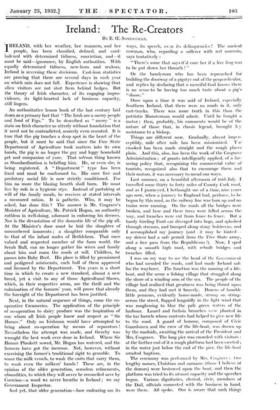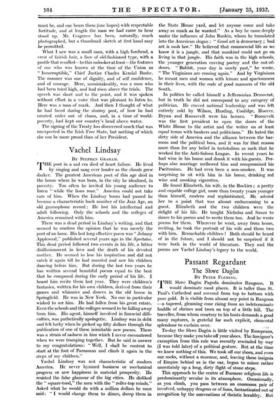Ireland: The Re-Creators
BY E. CE. SOMER VILLE.
IRELAND, with her weather, her manners, and her people, has been classified, defined, and card, Indexed with determined tidiness, conviction, and—it must be said—ignorance, by English authorities. With equally determined tidiness, new-born and zealous, Ireland is reversing these decisions. Cast-iron statistics are proving that there are several days in each year on Which rain does not fall. Experience is showing that alien visitors are not shot from behind hedges. But the theory of Irish character, of its engaging impro- vidence, its light-hearted lack of business capacity, still lingers.
An authoritative lesson book of the last century laid downas a primary fact that " The Irish are a merry people and fond of Pigs." To be described as " merry " is a stain on Irish character so utterly without foundation that it need not be contradicted, scarcely even resented. It is true that the pig touches a deep spot in the heart of the people, but it must be said that since the Free State Department of Agriculture took matters into its own hands, the pig is no longer the gay and leggy household pet and companion of yore. That solemn thing known as Standardization is befalling him. He, or even she, is being registered. A " Department " type has been fixed, and must be conformed to. His once free and predatory social life is now strictly conditioned. For him no more the blazing hearth shall burn. He must live by rule in a hygienic stye. Instead of partaking at will of "thefamily meals, he receives at stated intervals a measured ration. It is pathetic. Who, it may be asked, has done this ? The answer is Mr. Cosgrave's Minister of Agriculture, Mr. Patrick Hogan, an authority ruthless in well-doing, adamant in enforcing his decrees. Nor is the devastation of the domestic life of the pig all. At the Minister's door must be laid the slaughter of unnumbered innocents ; a slaughter comparable only to that of the infant males of Bethlehem. That once valued and respected member of the farm world, the Scrub Bull, can no longer gather his wives and family about him and roam the roads at will. Childless, he passes into Baby Beef. His place is filled by premiumed and pedigreed aristocrats, each bull of them approved and licensed by the Department. Ten years is a short time in which to create a new standard, almost a new breed, yet a visit to any of those Agricultural Shows, which, in their respective areas, are the thrill and the culmination of the farmers' year, will prove that already the foresight of the Department has been justified.
Next, in the natural sequence of things, come the co- operative Creameries. The application of the principle of co-operation to dairy produce was the inspiration of one whom all Irish people know and • respect as " Sir Horace." Only an Irishman would have attempted to bring about co-operation by means of separators ! Nevertheless the attempt was made, and thereby was wrought the best work ever done in Ireland. Where Sir Horace Plunkett sowed, Mr. Hogan has watered, and the farmers have got the increase. Not, however, without exercising the farmer's traditional right to grumble. To scour. the, milk vessels, to wash the carts that carry them, to wash even the milkers' hands ! These are, in the opinion of the older generation, senseless refinements, absurdities, to which.they will never be reconciled save by tioereiona word we never breathe in Ireland ; we say Government Inspector.
And yet, that older generation—how endearing are its ways, its speech, evan its delinquencies ! The ancient cowman, who, regarding a sufferer with red murrain, says tentatively : "There's some that says it'd cure her if a live frog was to be put down her throath ! "
Or the handyman who has been reproached for building the doorway of a pigstyc out of the perpendicular, and replies by declaring that a merciful God knows there is no sense to be having too much taste about a pig's " doore."
Once upon a time it was said of Ireland, especially Southern Ireland, that there were no roads in it, only cart-tracks. There was more truth in this than the patriotic Munstcrman would admit. Until he bought a motor ; then, probably, his comments would be of the nature of those that, in classic legend, brought ky assistance to a bishop.
Things are different now. Gradually, almost imper- ceptibly, mile after mile has been missionized. The crooked has been made straight and the rough places plain. And this, also, has been the work of the Cosgrave Administration ; of grants intelligently applied, of a far- seeing policy that, recognizing the commercial value of tourists, recognized also that to encourage them and their motors, it was necessary to mend our ways.
Last summer, on a beautiful afternoon of mid-July, travelled some thirty to forty miles of County Cork road, and as I journeyed, I bethought me of a time, nine years ago now, when a journey to England lied, perforce, to be begun by this road, as the railway line was torn up and no trains were running. On the roads all the bridges were broken, and here and there trees were felled across the way, and trenches were cut from fence to fence. But a hardy hireling Ford ear diverged into bogs, and splashed through streams, and bumped along stony bohircens, and I accomplished may journey (and--it may be hinted— my driver had a safe permit from the Free State army, and a free pass from the Republicans !). Now, I sped along a smooth high road, with rebuilt bridges and trenches filled.
I was on my way to see the head of the Government who had mended the roads, and had made Ireland safe for the wayfarer. The function was the naming of a life• boat, and the scene a fishing village that straggled along the shore of a winding arm of the sea. The people of the Village had realized that greatness was being thrust upon them, and they had met it bravely. Dozens of humble little pennons, evidently home-made, strung on string= across the street, flapped languidly in the light wind that was roughening to blue the pale green waters of the harbour. Laurel and fuchsia branches were planted in the tar barrels whose contents bad helped to give new life to the road. A guard of honour, composed of Civic Guardsmen and the crew of the life-boat, was drawn up by the roadside, awaiting the arrival of the President and Mrs. Cosgrave. The long pier was crowded wit 11 visitors ; at the farther end of it a rough platform had been erected ; in the water just below the end of the pier, the life-boat awaited baptism.
The ceremony was performed by Mrs. Cosgrave ; two lengthy names, Christian and surname (those I believe of the donors) were bestowed upon the boat, and then the platform was tried to its utmost capacity and the speeches began. Various dignitaries, clerical, civic, members of the Dail, officials connected with the business in hand, were there. All spoke. One is aware that such things must be, and one bears them (one hopes) with respectable fortitude, and at length the -man we had come to bear stood up. Mr. Cosgrave has been, naturally, much photographed, but a thumbnail sketch at first hand may be permitted.
What I saw was a small man, with a high forehead, a crest of fairish hair, a face of old-fashioned type, with a profile that recalled—to this onlooker at least—the features of one who was known at the time of the Union as " Incorruptible," Chief Justice Charles Kendal Bushc. The manner was one of dignity, and of self confidence, and of courage. Here, umnistakeahly, was a man who had been tried high, and had risen above the trials. The speech was short and to the point, and it was spoken without effort in a voice that was pleasant to listen to. Here was a man of mark. And then I thought of what he had faced during the stormy past, of how he had created order out of chaos, and, in a time of world- poverty, had kept our country's head above water.
The signing of the Treaty has discovered much that was unexpected in the Irish Free State, but nothing of which she can be inure proud than of her President.





































 Previous page
Previous page